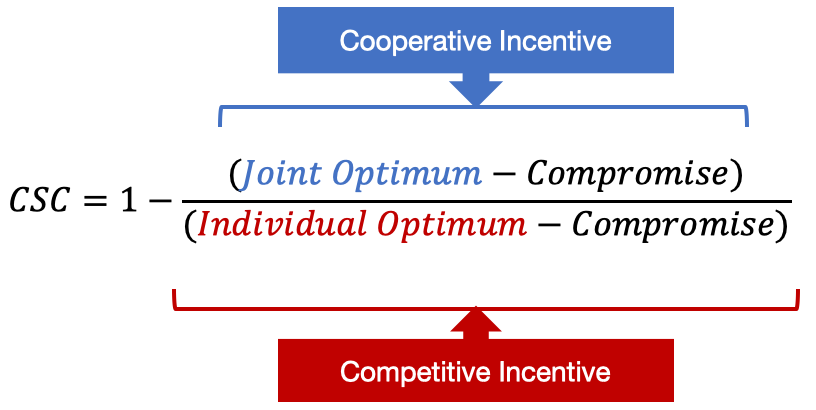Conflict Strength Coefficient
What do you want to know about the paper?
Definition and computation.
Conflict strength is defined as the cooperative incentive (i.e., the difference between a negotiator’s joint optimum and the negotiator’s compromise) divided by the competitive incentive (i.e., the difference between a negotiator’s individual optimum and the negotiator’s compromise).
The resulting proportion of the cooperative to the competitive incentive is subtracted from 1 so that higher values indicate more interpersonal conflict and higher conflict strength.

Abstract
Conflict management scholars study mixed-motive negotiation situations with cooperative and competitive incentives predominantly through multi-issue negotiation tasks in experimental studies. Intriguingly, experimenters currently lack an objective, generalizable, and continuous measure that precisely quantifies the incentives underlying these negotiation tasks. We present the conflict strength coefficient, which enables scholars to systematically quantify the incentive structures in these multi-issue negotiation tasks. By making the incentive structures accessible and numerically comparable, the conflict strength coefficient provides new insights into the central element of the experimental study of negotiation and conflict management, unmasks differences across existing tasks, facilitates research transparency, knowledge sharing, and open science practices. We demonstrate the coefficient’s benefits by providing a hands-on example from past research, by reviewing and quantitatively assessing the current literature, and by mapping conflict strength coefficients for the negotiation and conflict management research landscape and its subareas. Our analysis suggests that the conflict strength coefficient can enrich the understanding of cooperative and competitive incentives in the established tasks and directly guide and support an individual scholar’s process of knowledge creation. The conflict strength coefficient provides a methodological contribution to the experimental study of conflict management and negotiation with immediate benefits for the production of scientific knowledge, the experimental study of real-world phenomena, and theory development.
